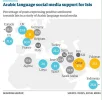Extremists Express support for Qatar on Social Media
By
Qatar Insider June 15, 2017
Share on Facebook Share on Twitter

Source:
The National
Abu Dhabi // Extremist leaders have used social media to offer their support to Qatar over the severing of relations with other GCC countries, The National has learnt.
Saudi Arabia, the UAE, Egypt and Bahrain last week took measures to isolate Qatar over its support for Islamist and terrorist groups.
On Friday, Riyadh and Abu Dhabi
imposed sanctions on 59 individuals and a dozen organisations based in Qatar for financial ties to extremist groups, including Al Qaeda.
Since diplomatic, transport and trade ties to Qatar were cut last week, a number of figures linked to Al Qaeda and sanctioned by the UN and US as terror supporters have offered their support to Doha.
Hamad Al Ali, who is accused of facilitating terrorist attacks in Kuwait, Iraq and elsewhere, described the measures taken against Doha as an “atrocious and heinous siege of the people of Qatar”.
His long statement was published by Al Jazeera on Twitter and Facebook before later being deleted, according to details of the posts seen by The National.
Abdallah Muhammad Al Muhaysini, who is accused of being a leader and fund-raiser for Jabhat Al Nusra, Al Qaeda’s affiliate in Syria, posted two statements of support for Qatar on Telegram.
Abdalrahman bin Omeir Al Nuaimi, a Qatari accused of financing terror groups including Al Qaeda branches in Iraq, Syria and Yemen, also posted messages on Twitter condemning the Saudi moves against Qatar.
Qatar has long been accused of financial links to extremist groups and allowing Islamists to base themselves in Doha and using Qatari media as a platform.
But the terrorism list published by the UAE and Saudi revealed the depth of Doha’s patronage to Islamist and extremist groups.



